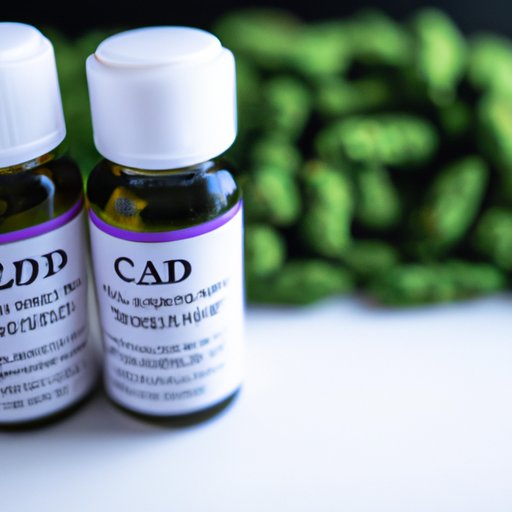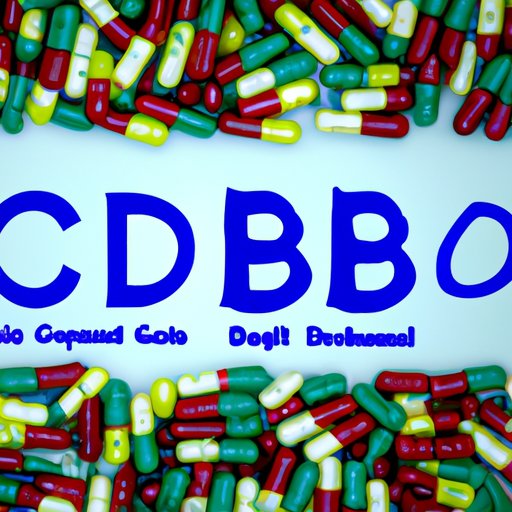
The Ultimate Guide to CBD Drug Interactions: What You Need to Know
Cannabidiol, or CBD, has become an increasingly popular alternative remedy for various medical conditions. It is a non-psychoactive compound extracted from the cannabis plant, which means it does not produce a “high” like tetrahydrocannabinol (THC) does. CBD has been touted for its potential benefits in reducing inflammation, pain, anxiety, and seizures, among other things. While the use of CBD is generally safe, it’s important to know about CBD drug interactions and how they can affect your health.
A Comprehensive List of Medications That CBD Interacts With
CBD can interact with certain medications in the body, which can lead to unwanted side effects or reduced effectiveness of the drugs. This is because CBD affects enzymes in the liver that are responsible for drug metabolism. Specifically, CBD can inhibit the cytochrome P450 (CYP450) enzyme system, which is responsible for metabolizing more than 60% of all prescription medications. When CBD interacts with this system, it can increase or decrease the levels of certain drugs in the bloodstream, leading to potential interactions with other medication combinations. Here is a list of medications that have potential interactions with CBD:
1. Blood Thinners
CBD can interact with blood thinners, such as warfarin, by increasing the effects of the medication in the body. This can increase the risk of bleeding or bruising. If you’re taking a blood thinner, it’s important to consult your doctor before using CBD.
2. Antidepressants
CBD can interact with antidepressants, such as SSRIs (selective serotonin reuptake inhibitors) and tricyclics, by increasing the effects of the medication in the body. This can lead to symptoms such as dizziness, confusion, and nausea. It’s important to talk to your doctor before using CBD if you’re taking an antidepressant.
3. Opioids
CBD can interact with opioids, such as fentanyl and oxycodone, by increasing the sedative effects of the medication. This can lead to increased drowsiness, confusion, and respiratory depression. If you’re taking an opioid, it’s important to talk to your doctor before using CBD.
4. Anti-Seizure Medications
CBD is commonly used as an alternative treatment for seizures, but it can interact with anti-seizure medications, such as clobazam and valproate, by increasing the levels of the medication in the body. This can lead to increased sedation and potential adverse reactions. If you’re taking an anti-seizure medication, it’s important to talk to your doctor before using CBD.
5. Drugs That Require the CYP450 Enzyme System
CBD can interact with drugs that require the CYP450 enzyme system for metabolism, such as benzodiazepines, calcium channel blockers, and antiarrhythmics. This can lead to increased or decreased effects of the medication in the body. It’s important to talk to your doctor before using CBD if you’re taking any medication that requires the CYP450 enzyme system.

Understanding CBD Interactions: Joint Effects of Medications
When combining medications and CBD, it’s important to understand how they can affect each other. In some cases, CBD can amplify or reduce the side effects of certain medications. For example, CBD can increase the sedative effects of opioids or benzodiazepines, leading to an increased risk of respiratory depression. On the other hand, CBD can counteract the nausea and vomiting caused by chemotherapy drugs. It’s important to talk to your doctor about potential interactions before combining CBD with any medication.
It’s also important to note that combining CBD with alcohol or illicit drugs can have unpredictable effects on the body. CBD can enhance the effects of alcohol, leading to increased impairment and potential risks. It’s best to avoid combining CBD with alcohol or illicit drugs.
CBD’s Interaction with Pharmaceutical Drugs: An Explainer
CBD can interact with prescription medications, over-the-counter drugs, supplements, and herbs. The CYP450 enzyme system is responsible for metabolizing many of these substances, so CBD can affect absorption, distribution, metabolism, and excretion of the drugs in the body. This can lead to potentially harmful interactions, reduced effectiveness of the drugs, or increased side effects. It’s important to talk to your doctor before using CBD with any medication or supplement.
The CYP450 enzyme system has multiple pathways, including CYP1A2, CYP2C19, CYP2D6, CYP2E1, and CYP3A4. Each pathway is responsible for metabolizing different substances. CBD can inhibit or induce these pathways, leading to differences in drug metabolism. For example, CBD can inhibit the CYP3A4 pathway, leading to increased levels of the drug in the body. This can occur with drugs such as antihistamines, antipsychotics, and some antidepressants. On the other hand, CBD can induce the CYP1A2 pathway, leading to decreased levels of caffeine and other drugs. It’s important to talk to your doctor about these potential interactions before using CBD with any medication.
Do You Know Which Medications CBD Interacts With? Find Out Here
Now that you know more about CBD drug interactions, let’s test your knowledge. Take this brief quiz to see if you know which medications can interact with CBD:
Quiz:
1. Which of the following medications can interact with CBD?
a. Blood thinners
b. Antidepressants
c. Opioids
d. All of the above
2. How does CBD affect the CYP450 enzyme system in the liver?
a. It inhibits the system
b. It induces the system
c. It has no effect on the system
3. Which of the following is NOT a potential interaction between CBD and medication?
a. Increased effectiveness of the medication
b. Reduced side effects of the medication
c. Decreased effectiveness of the medication
d. Increased side effects of the medication
Answers:
1. d
2. a
3. b
If you got all the answers correct, congratulations! You have a good understanding of CBD drug interactions. If you missed one or more questions, don’t worry. It’s important to talk to your doctor before using CBD with any medication to ensure your safety and well-being.

The Surprising Truth About CBD Interactions with Prescription Drugs
Despite the potential risks of CBD drug interactions, recent studies and clinical trials have found some positive effects of combining CBD and medications. For example, a study published in the American Journal of Psychiatry found that CBD can help reduce cravings and anxiety in people with heroin addiction. Another study published in the Journal of Clinical Psychopharmacology found that CBD can enhance the effects of antipsychotic medication in patients with schizophrenia.
However, these studies are still preliminary and more research is needed to fully understand the effects of CBD on medication interactions. Some studies have also found potential negative effects of combining CBD and medications, such as increased liver toxicity in people taking epilepsy medication. It’s important to stay informed about the latest research and talk to your doctor about any concerns you may have.
CBD vs Medications: Can They Coexist?
While CBD has benefits for some medical conditions, it’s important to remember that it is not a replacement for prescription medication. CBD can be used as a complementary therapy alongside medications, but it’s important to talk to your doctor about potential interactions and risks. Some potential benefits of combining CBD and medications include enhanced pain relief, reduced anxiety, and improved sleep. However, there are also risks to be aware of, such as increased sedation and potential adverse reactions. It’s important to monitor your symptoms and side effects carefully, and to talk to your doctor about any concerns.
Conclusion
CBD is a promising alternative remedy for various medical conditions, but it’s important to understand the potential risks of CBD drug interactions. By consulting with a healthcare professional and staying informed about the latest research, you can safely navigate the combination of CBD and medications. Remember to always talk to your doctor before using CBD with any medication, and to monitor your symptoms carefully. With careful attention and education, CBD can be a safe and effective complementary therapy for many people.
